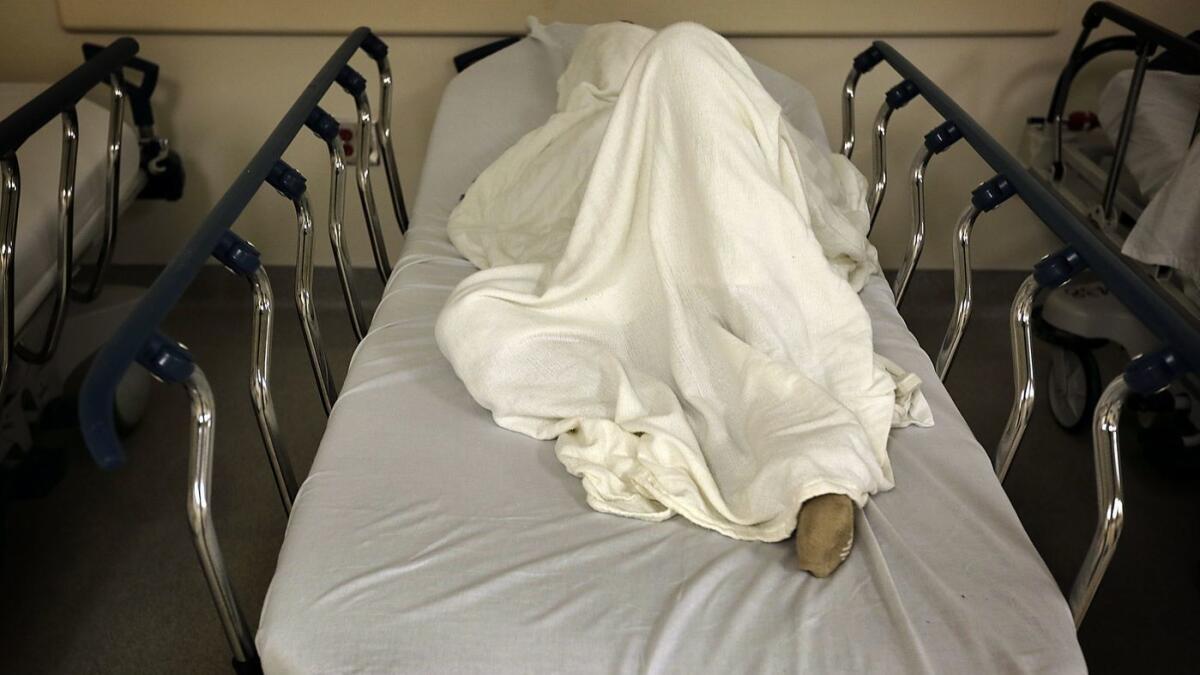Editorial: Mental health diversion law: A good idea that needs some work

- Share via
Earlier this summer, Gov. Jerry Brown signed a law allowing judges, at their discretion, to order community mental health treatment in lieu of prosecution for people accused of crimes. Some prosecutors and radio talk show hosts went nearly berserk, claiming that murderers and rapists would now go free simply by telling some gullible judge that whatever they did was due to health problems.
It’s tempting to dismiss the criticism of the bill, AB 1810, as just another groundless rant of the type that backward-looking, tough-on-crime critics have thrown at criminal justice reforms like AB 109 realignment and Propositions 47 and 57.
In this case, though, the critics have a point. Although it seems inconceivable that a judge would ever dismiss murder or rape charges just because the defendant claims mental illness, the law does, in theory, make such a thing possible. It’s a flaw that ought to be fixed.
Unfortunately, fixing it opens the door to wider efforts to entirely scrap a law that at its core is smart and badly needed. The task for lawmakers is to fine-tune the legislation that they passed and Brown signed just a few weeks ago without undermining its central purpose — the expanded diversion of mentally ill defendants from the criminal justice system — and to do it in the final weeks of the legislative session, when legislators are dealing with competing demands for their attention. It won’t be easy. But it’s important.
The real issue is who gets the power in the courtroom — the prosecutor or the judge — to decide between prosecution and treatment.
The legislation addresses a crisis in both mental health and criminal justice. California jails are increasingly filling up with mentally ill people who have been accused of crimes. Many are so sick they have been deemed incompetent to stand trial. So what do we do with them?
Ideally, they are sent to one of the limited number of California state hospitals where they are treated until finally fit to be tried for their alleged crimes. It may sound counterintuitive, but most patients who are hospitalized actually do get better and do go to court for further proceedings.
But those state hospitals are packed. With virtually every bed full, a growing number of ISTs (the state’s lingo for accused criminals who are incompetent to stand trial) are kept in local jails, where their mental condition is far less likely to improve and they are far less likely to proceed to trial. There they sit, taking up badly needed space, neither convicted of any crime (because they haven’t gone to trial) nor free to go home (because they have been charged).
Many of those defendants are chronically homeless. Because of their mental conditions they require close (and costly) observation. If they become competent to stand trial and they are convicted of a misdemeanor or a less-serious felony, they will often not return to jail because of overcrowding, but will instead go back to the street — until their illness again affects their behavior and they are again arrested, found incompetent to stand trial and returned to jail. It’s a foolish, costly, merry-go-round system.
Enter the Fray: First takes on the news of the minute from L.A. Times Opinion »
Counties have responded with a variety of programs that collectively are known as diversion. In Los Angeles County, hundreds of patients who are incompetent to stand trial have been diverted from jail into community treatment programs until they are fit for court. Hundreds of others — but still too few — who proceed to trial and are convicted go into community treatment in lieu of jail.
But it’s still not enough. The worthy goal of AB 1810 is to divert mentally ill people (including those likely to be found incompetent to stand trial) into treatment at the earliest point. Defendants who can present sufficient evidence that they suffer from a mental disorder — and who can show that that they do not pose an unreasonable risk to the public — would be able to ask judges to suspend criminal proceedings in favor of mental health treatment, which could last up to two years. After treatment, a judge, finding the defendant no longer a danger to the community, could dismiss the charge. Otherwise, there would be a hearing to determine whether to reinstate the prosecution.
It’s likely that even most prosecutors who are unhappy with the new law don’t honestly believe that judges will allow accused murderers and rapists to go free without trial. The real issue is who gets the power in the courtroom — the prosecutor or the judge — to decide between prosecution and treatment. Recent criminal justice reforms have begun to return to judges some discretion that had previously been transferred to prosecutors through excessive tough-on-crime legislation and ballot measures. Generally, discretion in the courtroom properly belongs with the judge, but it must be balanced so as to protect the public. To achieve that balance, AB 1810 needs a little work.
Follow the Opinion section on Twitter @latimesopinion and Facebook
More to Read
A cure for the common opinion
Get thought-provoking perspectives with our weekly newsletter.
You may occasionally receive promotional content from the Los Angeles Times.






